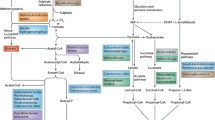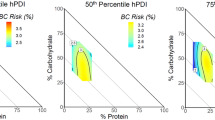Abstract
This investigation was based on an epidemiologic association of milk consumption and decreased intestinal cancer risk. Furthermore, there is also some indirect evidence that calcium supplementation in humans and animals may decrease colon cancer risk and that calcium, by inference, may be the protective factor in milk. In order to investigate these associations in a controlled laboratory setting, dietary supplementation of low fat dried milk (37g/kg diet; N=18) and calcium carbonate (40 mg/kg rat/day; N=17) were compared separately to regular diet controls in the rat-dimethylhydrazine colon carcinogenesis model. The results of this investigation showed that neither milksupplemented rats nor calcium carbonate-supplemented rats had fewer DMH-induced colorectal (P=.374) or total gastrointestinal tumors (P=.291) than did regular diet controls (N=10; by analysis of variance [ANOVA]). Milk supplementation did result in a significant decrease in tumor burden when measured by incidence of metastases (P=.035) and of intestinal obstruction (P=.011; by chi-square test), when compared with calcium-supplemented and control rats. Though this implies that milk supplementation provides protection against some aspects of carcinogenesis of the colon, in rats fed low fat diets, this does not appear to be mediated through the calcium content of milk.
Similar content being viewed by others
References
Nelson RL. dietary minerals and colon cancer. Anticancer Res 1987;7:259–70.
Anonymous. Calcium and vitamin D intakes influence the risk of bowel cancer in men. Nutr Rev 1985;43:170–2.
Garland C, Barrett-Connor E, Rossoff AH, Shekelle RB, Criqui MH, Paul O. Dietary vitamin D and calcium and risk of colorectal cancer: a 19 year prospective study. Lancet 1985;1:307–9.
Nelson RL. Experimental colon cancer: what animal models have demonstrated about the origin of human colon cancer. Curr Surg 1983;40:419–23.
Samelson SL, Nelson RL, Nyhus LM. The protective effect of faecal pH on experimental colon carcinogenesis. J R Soc Med 1985;78:230–3.
Rooma M, Uibu J. Influence of various milk products on the concentration of nitrite and the formation of nitrosodimethylamine in vitro. Nutr Cancer 1983;4:171–4.
Whitfield JF, Boynton AL, MacManus JP, Sikorska M, Tsang BK. The regulation of cell proliferation by calcium and cyclic AMP. Mol Cell Biochem 1979;27:155–79.
Newmark HL, Wargovich MJ, Bruce WR. Colon cancer and dietary fat, phosphate and calcium: a hypothesis. JNCI 1984;72: 1323–5.
Wargovich MJ, Eng VW, Newmark HL, Bruce WR. Calcium ameliorates the toxic effect of deoxycholic acid on colonic epithelium. Carcinogenesis 1983;4:1205–7.
Lipkin M, Newmark H Effect of added dietary calcium on colonic epithelial-cell proliferation in subjects at high risk for familial colon cancer. N Engl J Med 1985;313:1381–4.
Lipkin M, Uehara K, Winawer S., et al. Seventh Day Adventists have a quiescent proliferative activity in colonic mucosa. Cancer Lett 1985;26:139–44.
Bristol JB, Emmett PM, Heaton KW, Williamson RC. Sugar, fat and the risk of colorectal cancer. Br Med J 1985;291:1467–70.
Kritchevsky D, Weber MM, Klurfeld DM. Dietary fat versus caloric content in initiation and promotion of 7,12-dimethylenebenz(a)-anthracene-induced mammary tumorigenesis in rats. Can Res 1984;44:3174–7.
Nutter RL, Gridley DS, Kettering JD, Goude AG, Slater JM. BALB/c mice fed milk or beef protein: differences in response to 1,2 dimethylhydrazine carcinogenesis. JCNI 1983;71:867–74.
Shackelford LA, Rao DR, Cahwan CB, Pulusani SR. Effect of feeding fermented milk on the incidence of chemically induced colon tumors in rats. Nutr Cancer 1983;5:159–64.
Author information
Authors and Affiliations
Additional information
Supported by grants from John W. Ruettinger and the University of Illinois Foundation.
About this article
Cite this article
Nelson, R.L., Tanure, J.C. & Andrianopoulos, G. The effect of dietary milk and calcium on experimental colorectal carcinogenesis. Dis Colon Rectum 30, 947–949 (1987). https://doi.org/10.1007/BF02554282
Issue Date:
DOI: https://doi.org/10.1007/BF02554282




